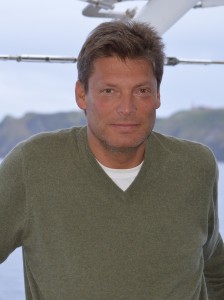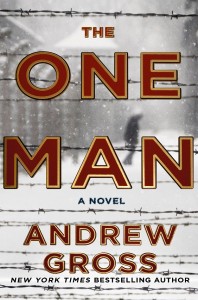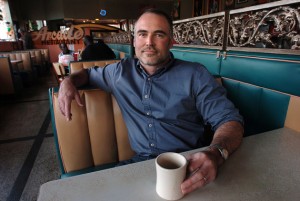Andrew Gross is known to millions of readers as an internationally bestselling author of thrillers.
But, The One Man is a riveting historical thriller unlike anything else Andrew Goss has ever written. Behind the barbed wire of Auschwitz, Professor Alfred Mendl seems just like an old man who writes gibberish on scraps of paper, but the U.S. government knows Mendl’s knowledge could very well change the course of history.
U.S. Army Lieutenant Nathan Blum, an escapee from the Krakow ghetto, whose family died at the hands of the Nazis, is asked to sneak into Auschwitz on a mission to find Mendl and get him out alive.
You’re very well known for writing ‘suburban’ thrillers. What made you undertake this departure into historical fiction with The One Man?
I wanted to write stories with bigger bones. Publishing, and to some degree your own readers, typecast you into a familiar role. While I was comfortable writing stories in which you can look at a character and hold up a lens and see yourself, I felt constrained by that genre. I felt it was holding me back as a writer, and I wanted to write books more in line with what I would like to read. I wanted to expand my horizons.
The One Man is richly evocative with descriptions of military intelligence, Auschwitz, and many other World War II details. It reminds me of some of Leon Uris’s books. Tell us a bit about your research for this novel.
When you’re writing ‘suburban fiction,’ you can always wing it. In that kind of fiction, very few elements of reality are sacrosanct. When writing about the Holocaust, you can’t just make stuff up. As a Jew writing about the Holocaust, it’s sacred territory…it’s ‘Ground Zero.’ I felt an obligation to represent things not only accurately, but compellingly. I’ve been to several concentration camps. Over the years, I’ve read the litany of Holocaust books, including Night by Elie Weisel, Sophie’s Choice and many others. I had to immerse myself in many different aspects of those events: from the American attitude toward Jews during World War II, Franklin Roosevelt’s thinking, and to atomic physics, which is an important component of the book. But it was my goal to write a story about heroism, not about atrocity—so, while I wanted the landscape of the death camps to be real, I wanted to write about one man in an extraordinary situation who stood up and demonstrated heroism. I didn’t just want to add my name to the canon of Holocaust literature describing atrocity or the will to survive. But the setting was important to portray accurately.
I know from what you have said that The One Man has some very personal meanings for you. Will you tell us about that?
My father-in-law who recently died at ninety-six, came to this country six months before Poland was invaded in World War II. He never knew what happened to his entire family. He was the only one to survive the war. Because of that, he carried a mantle of guilt and loss that no one really understood. He would never talk about any of that and never wanted to go back to Warsaw because it conjured up such sad memories for him.
I wanted to understand what was behind this burden of guilt and shame that followed him here for his entire life. He was never happy and never free of his memories. His ‘Survivor’s Guilt’ intrigued me. In composing this book, I wanted to write a story that was almost the story he would have told if he could have opened up enough to tell it.
He joined the U.S. Army and was put into the OSS. He never talked about what he did there, either. While the rest of the novel is fiction, it’s really my putting into his mouth what I think he might have said had he ever opened up about things.
Do you feel you’ve taken a personal risk in writing this historical thriller as opposed to continuing with ‘suburban’ thrillers?
Absolutely. The risk began when I ended one contract with my previous publisher and began trying to sell the outline of The One Man. Various publishers wanted to take me on provided I continued to write conventional thrillers. Some didn’t want to take the risk to find out whether or not I had the chops to write an historical novel. And there was the chance some of my readers wouldn’t follow me along. But really, people always crave a great story.
So, I’m exploring a new territory and hoping I can establish myself in this genre. The business of writing commercial fiction involves a great deal of risk.
This brings me to my next question. As a successful author of thrillers, what thoughts do you have about writers being relegated to certain genres?
It’s a tough industry. From a business perspective, everyone talks about branding an author. It’s hard to sell books and especially more difficult if you’re trying to convey a new image or present a different brand. Name recognition and salability are really the defining parameters, and most authors find themselves locked into a specific genre.
The bottom line is I have to write what’s in my heart. When you do that, the best stories emerge. I’ll make this analogy: when I go to funerals, people speaking are often filled with an innate eloquence coming from the heart. Even those who aren’t storytellers can convey compellingly things about a person because their words are heartfelt.
Looking back at your career, have your writing process and style changed?
My process hasn’t changed. I learned a great deal from working with James Patterson. I outline my stories and keep the chapters relatively short. My work regimen is still the same.
My style has evolved. In the beginning, I started out writing sixty percent for pacing and forty percent for character; I now spend more time on developing people and settings than formerly. I want to deal with larger themes, and that requires a different style and more richness in my prose.
What has surprised you about the writing life?
On the positive side, I feel blessed to be able to do this. I’m so lucky I don’t have to be on a train going into Manhattan for a day’s work. I still manage to get paid for what I do during the course of a year. So, the flexibility of the writing life has changed me. It’s made me a much easier person to be around.
Negatively, it can be a frustrating life. The business is often irksome because it’s very difficult to market one’s self these days. On any given week, the bestseller list resembles the one from ten years ago.
Unless you enjoy that fully-branded status, it’s challenging to market yourself successfully in today’s publishing world.
If you could re-read any one novel as though you’re reading it for the first time, which one would it be?
I recently re-read All the King’s Men by Robert Penn Warren.
I’ve picked that one because it might be the most beautifully written book ever written by an American. We’re all taught it’s a book about a Huey Long figure, Willie Stark, and it’s a political novel; but my take on it is now through completely different eyes. To me, it’s the Telemachus myth about a son’s search for his own father. And that made this book incredibly beautiful for me.
What’s coming next from Andrew Gross?
Another World War II novel. It’s based on an unknown incident that’s been unearthed: the story of a British-Norwegian raid on the heavy water facilities in Norway that ended the Nazis’ attempts to create an atomic bomb. It’s an incredible David and Goliath story. I’m taking some liberties with it and doing it as a novel.
Congratulations on writing The One Man, an historical novel David Morrell called, ‘suspenseful, taut, terrific” and about which Steve Berry said, ‘The characters are intriguing, richly drawn, and wrestle with the unforgivable triangle of evil, guilt and the choices they must make.’





